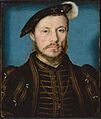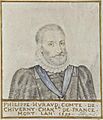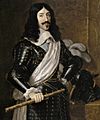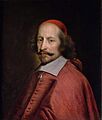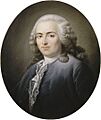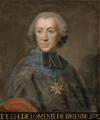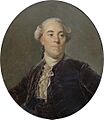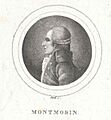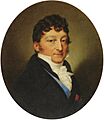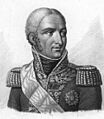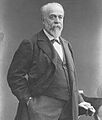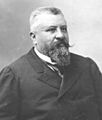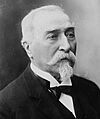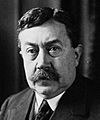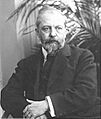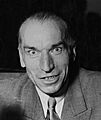List of prime ministers of France facts for kids
France has a special leader for its government, called the Prime Minister. This role has been around since 1959. Before that, the person in charge of the government had different titles, like "President of the Council of Ministers." It's important not to confuse the Prime Minister with the President of France, who is the head of state and chooses the Prime Minister. The Prime Minister helps the President run the country every day.
Contents
- Leaders in Early French History (16th to 18th Century)
- Changes in Leadership (18th to 19th Century)
- Leaders in More Recent French History (19th to 20th Century)
- Prime Ministers of the Fifth French Republic (Since 1958)
- Living Former Prime Ministers
- Timeline of French Government Leaders
- Images for kids
- See also
Leaders in Early French History (16th to 18th Century)
For many centuries, France was a kingdom ruled by kings. These kings had important advisors who helped them make decisions and manage the country. While there wasn't an official "Prime Minister" title back then, some of these advisors, often called "chief ministers," were very powerful and acted like the head of the government. They helped the king with everything from laws to wars.
Changes in Leadership (18th to 19th Century)
France went through many big changes during this time, including revolutions and empires. The way the government was led changed often:
- During the First Republic (1792–1804), leadership was shared by different groups, like the National Convention and the Directory. Later, Napoleon Bonaparte became the First Consul, taking charge.
- Under the First Empire (1804–1815), Napoleon was both the head of state and the head of government as Emperor.
- After Napoleon, France became a kingdom again during the Bourbon Restoration (1815–1830) and the July Monarchy (1830–1848). During these times, the main government leader was called the "President of the Council of Ministers."
- The Second Republic (1848–1852) also had Presidents of the Council of Ministers, but it was a short period before Napoleon III became Emperor, starting the Second Empire (1852–1870). During the Second Empire, Napoleon III was in charge, and there wasn't a separate head of government.
Leaders in More Recent French History (19th to 20th Century)
France continued to change its government structure.
- The Third French Republic (1870–1940) was a long period where the "President of the Council of Ministers" was the main leader of the government. Many different people held this role, helping to shape modern France.
- During the French State (1940–1944), Marshal Philippe Pétain was the Chief of State. For part of this time, Pierre Laval was named Chief of the Government.
- After World War II, the Provisional Government of the French Republic (1944–1946) was set up to rebuild the country. Leaders like Charles de Gaulle served as Chairmen during this important time.
- The Fourth French Republic (1946–1958) also had "Presidents of the Council of Ministers" who led the government. This period saw many changes in leadership.
Prime Ministers of the Fifth French Republic (Since 1958)
Since 1958, France has been under its Fifth Republic. In this system, the head of government is officially called the Prime Minister. The President of France chooses the Prime Minister, who then forms a government and works to carry out the country's policies.
| S. No. | Portrait | Prime Minister (Lifespan) |
Term of office | Political party (Political coalition) |
Government | Legislature (Election) |
President (Term) |
||||
|---|---|---|---|---|---|---|---|---|---|---|---|
| Term of office | Duration | ||||||||||
| 77 |  |
Michel Debré (1912–1996) |
8 January 1959 | 14 April 1962 | 3 years, 96 days | Union for the New Republic | Debré | I (1958) |
18 | Charles de Gaulle (1959–1969) |
|
| 78 |  |
Georges Pompidou (1911–1974) |
14 April 1962 | 7 December 1962 | 6 years, 87 days | Union for the New Republic | Pompidou I | ||||
| 7 December 1962 | 8 January 1966 | Pompidou II | II (1962) |
||||||||
| 8 January 1966 | 7 April 1967 | Pompidou III | |||||||||
| 7 April 1967 | 10 July 1968 | Pompidou IV | III (1967) |
||||||||
| 79 |  |
Maurice Couve de Murville (1907–1999) |
10 July 1968 | 20 June 1969 | 345 days | Union of Democrats for the Republic | Couve de Murville | IV (1968) |
|||
| 80 |  |
Jacques Chaban-Delmas (1915–2000) |
20 June 1969 | 5 July 1972 | 3 years, 15 days | Union of Democrats for the Republic | Chaban-Delmas | 19 | Georges Pompidou | ||
| 81 |  |
Pierre Messmer (1916–2007) |
5 July 1972 | 5 April 1973 | 1 year, 326 days | Union of Democrats for the Republic | Messmer I | ||||
| 5 April 1973 | 1 March 1974 | Messmer II | V (1973) |
||||||||
| 1 March 1974 | 27 May 1974 | Messmer III | |||||||||
| 82 |  |
Jacques Chirac (1932–2019) |
27 May 1974 | 25 August 1976 | 2 years, 90 days | Union of Democrats for the Republic | Chirac I | 20 | Valéry Giscard d'Estaing (1974–1981) |
||
| 83 |  |
Raymond Barre (1924–2007) |
25 August 1976 | 30 March 1977 | 4 years, 269 days | Miscellaneous right (Union for French Democracy) |
Barre I | ||||
| 30 March 1977 | 5 April 1978 | Barre II | |||||||||
| 5 April 1978 | 21 May 1981 | Barre III | VI (1978) |
||||||||
| 84 |  |
Pierre Mauroy (1928–2013) |
21 May 1981 | 23 June 1981 | 3 years, 57 days | Socialist Party | Mauroy I | 21 | François Mitterrand (1981–1995) |
||
| 23 June 1981 | 22 March 1983 | Mauroy II | VII (1981) |
||||||||
| 22 March 1983 | 17 July 1984 | Mauroy III | |||||||||
| 85 |  |
Laurent Fabius (b. 1946) |
17 July 1984 | 20 March 1986 | 1 year, 246 days | Socialist Party | Fabius | ||||
| (82) |  |
Jacques Chirac (1932–2019) |
20 March 1986 | 10 May 1988 | 2 years, 51 days | Rally for the Republic | Chirac II | VIII (1986) |
|||
| 86 |  |
Michel Rocard (1930–2016) |
10 May 1988 | 28 June 1988 | 3 years, 5 days | Socialist Party | Rocard I | ||||
| 28 June 1988 | 15 May 1991 | Rocard II | IX (1988) |
||||||||
| 87 |  |
Édith Cresson (b. 1934) |
15 May 1991 | 2 April 1992 | 323 days | Socialist Party | Cresson | ||||
| 88 |  |
Pierre Bérégovoy (1925–1993) |
2 April 1992 | 29 March 1993 | 361 days | Socialist Party | Bérégovoy | ||||
| 89 |  |
Édouard Balladur (b. 1929) |
29 March 1993 | 17 May 1995 | 2 years, 49 days | Rally for the Republic | Balladur | X (1993) |
|||
| 90 |  |
Alain Juppé (b. 1945) |
17 May 1995 | 7 November 1995 | 2 years, 16 days | Rally for the Republic | Juppé I | 22 | Jacques Chirac (1995–2007) |
||
| 7 November 1995 | 2 June 1997 | Juppé II | |||||||||
| 91 |  |
Lionel Jospin (b. 1937) |
2 June 1997 | 6 May 2002 | 4 years, 338 days | Socialist Party | Jospin | XI (1997) |
|||
| 92 |  |
Jean-Pierre Raffarin (b. 1948) |
6 May 2002 | 17 June 2002 | 3 years, 25 days | Liberal Democracy, later Union for a Popular Movement |
Raffarin I | ||||
| 17 June 2002 | 31 March 2004 | Raffarin II | XII (2002) |
||||||||
| 31 March 2004 | 31 May 2005 | Raffarin III | |||||||||
| 93 |  |
Dominique de Villepin (b. 1953) |
31 May 2005 | 17 May 2007 | 1 year, 351 days | Union for a Popular Movement | Villepin | ||||
| 94 |  |
François Fillon (b. 1954) |
17 May 2007 | 19 June 2007 | 4 years, 364 days | Union for a Popular Movement | Fillon I | 23 | Nicolas Sarkozy (2007–2012) |
||
| 19 June 2007 | 14 November 2010 | Fillon II | XIII (2007) |
||||||||
| 14 November 2010 | 15 May 2012 | Fillon III | |||||||||
| 95 |  |
Jean-Marc Ayrault (b. 1950) |
15 May 2012 | 21 June 2012 | 1 year, 320 days | Socialist Party | Ayrault I | 24 | François Hollande (2012–2017) |
||
| 21 June 2012 | 31 March 2014 | Ayrault II | XIV (2012) |
||||||||
| 96 |  |
Manuel Valls (b. 1962) |
31 March 2014 | 26 August 2014 | 2 years, 250 days | Socialist Party | Valls I | ||||
| 26 August 2014 | 6 December 2016 | Valls II | |||||||||
| 97 |  |
Bernard Cazeneuve (b. 1963) |
6 December 2016 | 15 May 2017 | 160 days | Socialist Party | Cazeneuve | ||||
| 98 |  |
Édouard Philippe (b. 1970) |
15 May 2017 | 21 June 2017 | 3 years, 49 days | The Republicans, later Independent |
Philippe I | 25 | Emmanuel Macron | ||
| 21 June 2017 | 3 July 2020 | Philippe II | XV (2017) |
||||||||
| 99 |  |
Jean Castex (b. 1965) |
3 July 2020 | 16 May 2022 | 1 year, 317 days | Independent | Castex | ||||
| 100 |  |
Élisabeth Borne (b. 1961) |
16 May 2022 | 4 July 2022 | 1 year, 238 days | Renaissance | Borne I | ||||
| 4 July 2022 | 9 January 2024 | Borne II | XVI (2022) |
||||||||
| 101 |  |
Gabriel Attal (b. 1989) |
9 January 2024 | 5 September 2024 | 240 days | Renaissance | Attal | ||||
| 102 |  |
Michel Barnier (b. 1951) |
5 September 2024 | 13 December 2024 | 99 days | The Republicans | Barnier | XVII (2024) |
|||
| 103 |  |
François Bayrou (b. 1951) |
13 December 2024 | 9 September 2025 | 270 days | Democratic Movement | Bayrou | ||||
| 104 |  |
Sébastien Lecornu (b. 1986) |
9 September 2025 | 10 October 2025 | 31 days | Renaissance | Lecornu I | ||||
| 10 October 2025 | Incumbent | Lecornu II | |||||||||
Living Former Prime Ministers
It's interesting to see how many former Prime Ministers are still with us today! Here's a list of those who are still alive:
| Name | Mandate | Date of birth |
|---|---|---|
| Laurent Fabius | 1984 – 1986 | 20 August 1946 |
| Édith Cresson | 1991 – 1992 | 27 January 1934 |
| Édouard Balladur | 1993 – 1995 | 2 May 1929 |
| Alain Juppé | 1995 – 1997 | 15 August 1945 |
| Lionel Jospin | 1997 – 2002 | 12 July 1937 |
| Jean-Pierre Raffarin | 2002 – 2005 | 3 August 1948 |
| Dominique de Villepin | 2005 – 2007 | 14 November 1953 |
| François Fillon | 2007 – 2012 | 4 March 1954 |
| Jean-Marc Ayrault | 2012 – 2014 | 25 January 1950 |
| Manuel Valls | 2014 – 2016 | 13 August 1962 |
| Bernard Cazeneuve | 2016 – 2017 | 2 June 1963 |
| Édouard Philippe | 2017 – 2020 | 28 November 1970 |
| Jean Castex | 2020 – 2022 | 25 June 1965 |
| Élisabeth Borne | 2022 – 2024 | 18 April 1961 |
| Gabriel Attal | 2024 | 16 March 1989 |
| Michel Barnier | 2024 | 9 January 1951 |
| François Bayrou | 2024 – 2025 | 25 May 1951 |
| Sébastien Lecornu | 2025 | 11 June 1986 |
The most recent death of a former prime minister was that of Jacques Chirac (who served from 1974–1976 and 1986–1988), who passed away on 26 September 2019 at the age of 86.
Timeline of French Government Leaders
Executive Prime Ministers (1814–1959)
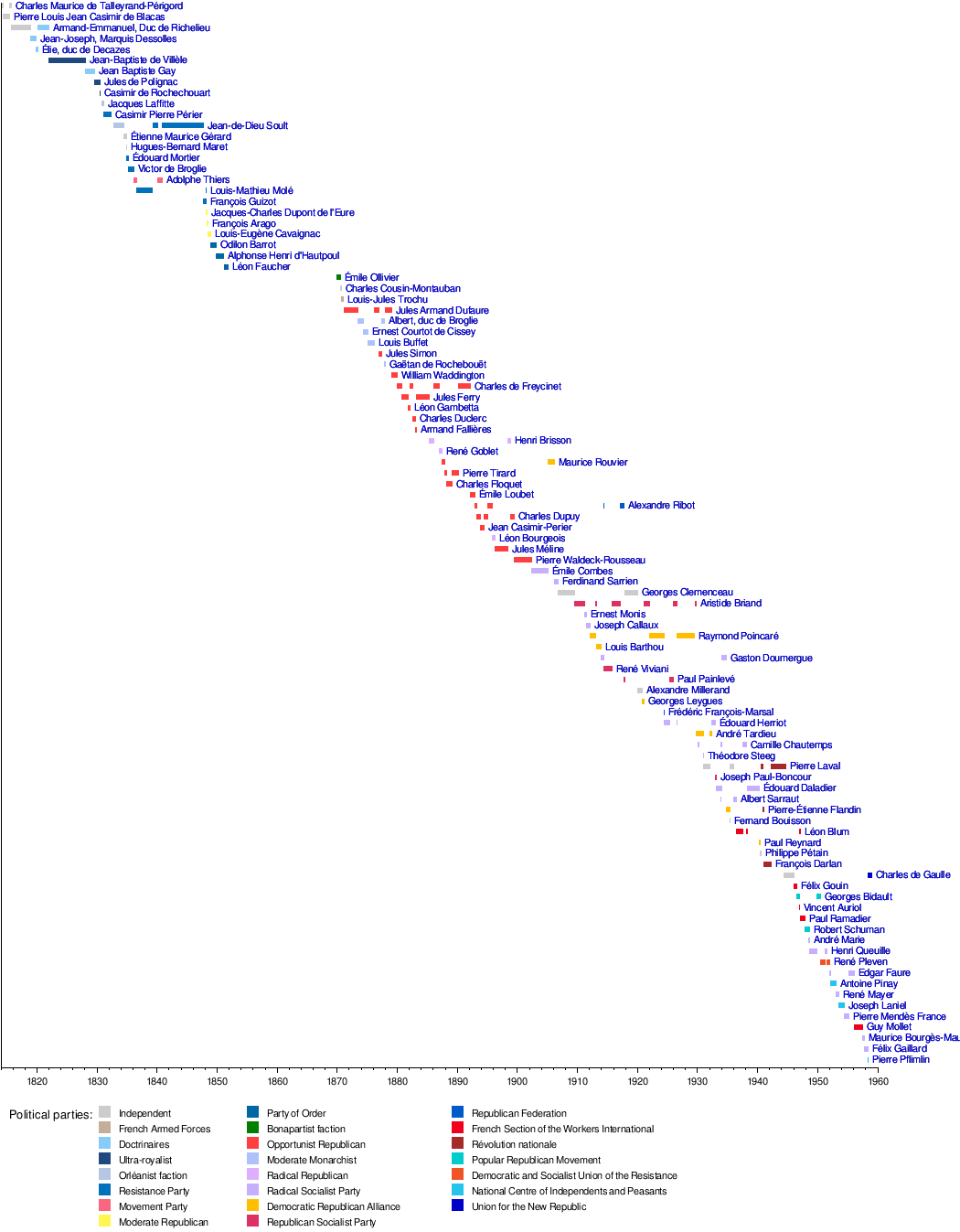
Semi-executive Prime Ministers (since 1959)
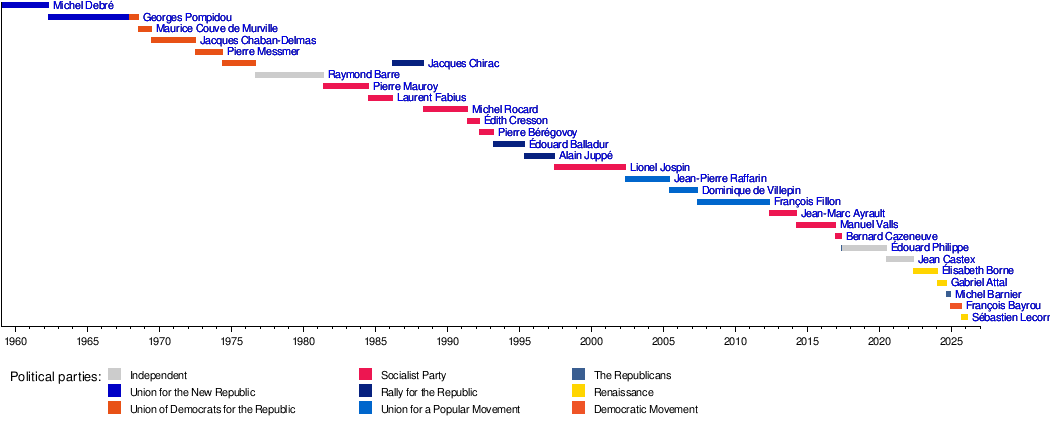
Images for kids
See also
 | Victor J. Glover |
 | Yvonne Cagle |
 | Jeanette Epps |
 | Bernard A. Harris Jr. |



